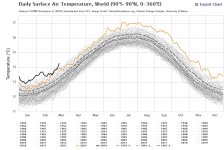I trust scientists more than I trust you or your random unverifiable claims. And yes, that includes prominent scientists in IPCC. Sorry you disagree. I don't care.
"Heat islands may skew long-term temperature records as urbanization encroaches on weather stations located near the outskirts of town. Consequently, researchers must remove heat island effects from temperature records to accurately estimate climate change.
The data may be corrected in a variety of ways. In some cases, researchers statistically adjust urban weather station data to match trends seen in nearby rural stations; in other analyses urban data are simply excluded from the record."
EPA
See... not that hard.
You wanted a paper?
"Urban heat island effects are real but local, and have
not biased the large-scale trends. A number of recent studies
indicate that effects of urbanisation and land use change on
the land-based temperature record are negligible (0.006ºC per
decade) as far as hemispheric- and continental-scale averages
are concerned because the very real but local effects are
avoided or accounted for in the data sets used. In any case, they
are not present in the SST component of the record. Increasing
evidence suggests that urban heat island effects extend to
changes in precipitation, clouds and DTR, with these detectable
as a ‘weekend effect’ owing to lower pollution and other effects
during weekends."
IPCC paper - oh no! IPCC! The enemy of the people!

